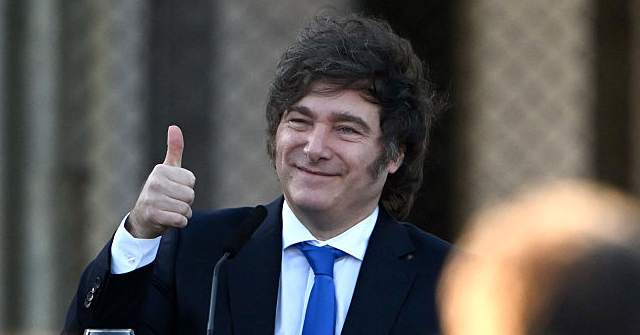Argentine President Javier Milei on Thursday presented a new “Zero Tolerance” draft bill to overhaul the nation’s over 100-year-old Penal Code and impose tougher penalties for criminals as part of Milei’s goal to “Make Argentina Great Again.”
The proposed reforms, which Milei stressed must be approved by Congress, call for expedited penal proceedings, increased prison sentences for crimes across the board, and the introduction of an accusation system in Argentine courts.
The proposal also calls for crimes related to drug sales and trafficking, terrorism and terrorism financing, crimes against humanity, and crimes against the sexual integrity of others such as sexual trafficking, prostitution, and child pornography to not be subject to statutes of limitation alongside other, equally heinous crimes.
Additionally, the text calls for a reduction in the legal age of criminal responsibility from 16 to 13 on the grounds that teenagers “understand the criminality of their actions and that current legislation favors their recruitment by criminal groups.”
Milei made the announcement alongside Security Minister Patricia Bullrich outside the Ezeiza Prison, located some 30 miles outside of the capital city of Buenos Aires. The Argentine president said that, if approved, the reforms would end “years of legal guarantees that tied the hands of law enforcement, judges, and prosecutors who wanted to fight crime.”
Milei noted that Argentine society gave him a clear mandate “to end the scourge of insecurity,” and noted that his administration has done everything in its power over the past year and a half to fulfill that task.

“Therefore, as part of our goal to make Argentina great again, order is a prerequisite, and that is why we need zero tolerance, because those who break the law must pay for it, and that is what we have come here to do today,” Milei said during his speech.
“We need tougher penalties, applied to those who deserve them, trials that are conducted quickly, and criminals who serve their sentences where they belong, in prison, so that decent Argentines can once again live in freedom,” he continued.
Security Minister Bullrich explained that Argentina’s current Penal Code has acquired 100 years’ worth of amendments; to streamline the legal system the government has presented a modern and updated Penal Code proposal that “defends victims and not the delinquents.” Argentina’s current Penal Code was originally implemented in November 1921 and has been modified 159 times since then.
Bullrich summarized that the new proposed text has three main elements: the fight against crime through harsher penalties; the non-applicability of statutes of limitation to heinous crimes; and the effective enforcement of sentences.
She detailed that complex and serious crimes such as drug trafficking, human trafficking, organized crime, kidnapping for ransom, and child pornography would now carry heavy penalties and stressed that, “Today, major drug traffickers often get off with summary trials and sentences of less than six years.”
Crimes such as burglaries, pyramid schemes, and virtual kidnappings, she further detailed, are now a large part of the crimes committed in Argentina, and would now be considered serious crimes alongside others such as procedural fraud, revenge porn, and harassment, all of which are presently considered misdemeanors.
“All of these types of crimes, which people are well aware of because they suffer them on a daily basis, will now be classified as new crimes with severe penalties,” Bullrich said.
On the reduction of Argentina’s legal age of criminal responsibility from 16 to 13 years, Bullrich explained that presently, drug traffickers use 14- or 15-year-old “child soldiers” to commit murder and “return home as if nothing had happened. That is why we are proposing to lower the age of criminal responsibility to 13.”
The revised Penal Code would also introduce provisions that expand law enforcement and security officials’ right to legitimate defense by introducing the concept of “duty fulfillment and self-defense” granting legal protections to officials when they have to act in accordance to the law and Constitution so that they “do not end up being perpetrators when they are the ones to whom the nation has given weapons and the people pay their salaries so that they can work for the people.”
“Zero Tolerance. He who does it [the crime] pays for it. The fun is over for the criminals. Long Live Liberty Damn It,” Milei wrote on social media.
Argentina will hold a midterm legislative election on October 26 to renew about half of the seats in the Chamber of Deputies and Senate. Milei said that if his “Zero Tolerance” Penal Code reforms are passed, those who commit crimes “will pay dearly, and law-abiding Argentines will live in a safer society.”
“But whether or not this set of reforms is implemented depends directly on the National Congress; it depends on those who sit in the seats of legislative power, whether they have the will to side with the victims and not with the criminals,” Milei said. “That is why the country needs representatives and senators who understand this; there is no middle ground. If we approve this reform, security in Argentina will change significantly. We all know that the system cannot continue as it is and must be changed.”
Christian K. Caruzo is a Venezuelan writer and documents life under socialism. You can follow him on Twitter here.
Read the full article here


